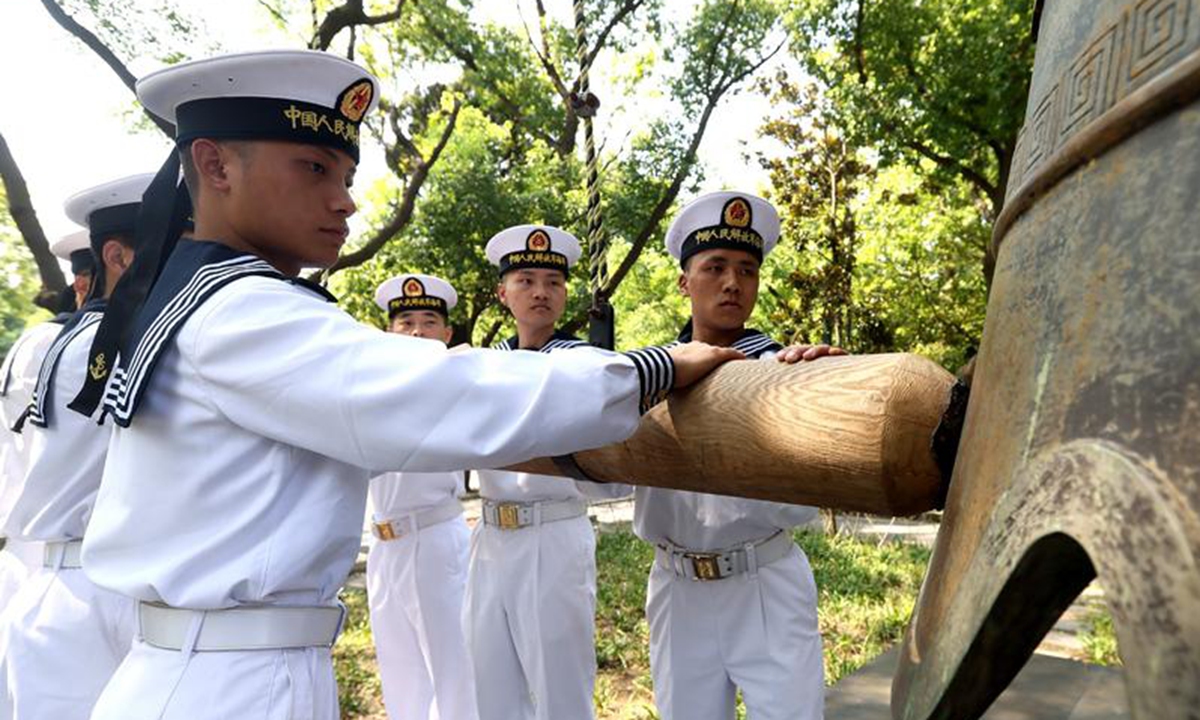Washington should talk the talk and walk the walk: Global Times editorial
Source: Global Times Published: 2020/9/3 20:38:40

People's Liberation Army Navy soldiers strike a bell to commemorate the 75th anniversary of the victory of the Chinese People's War of Resistance Against Japanese Aggression and the World Anti-Fascist War in Shanghai, Sept 3, 2020. Photo: Xinhua
September 3 marked the 75th anniversary of China's victory in the War of Resistance against Japanese Aggression. Previously, Russia changed the date to mark the end of the World War II from September 2 to September 3. On Thursday (September 3), China and Russia jointly commemorated this heroic and historic anniversary. In Hawaii where Japan bombed Pearl Harbor, the US held separate celebrations on September 2 as well.China, Russia and the US were partners during the WWII. Unfortunately, more than 70 years later, both Beijing and Moscow have been publicly labeled as Washington's strategic competitors. And ironically, Washington's closest ally in Asia is Tokyo.
US Defense Secretary Mark Esper criticized China without naming it during the celebrations. These comments at least show that he remembers that China used to be a partner of the US - and he should have been well aware to exercise restraint with his words. But he didn't. He touted how the Western alliance system, an outcome of the war, led to the disintegration of the Soviet Union. But the Soviet Union contributed to defeating Nazi Germany and Japan in the war.
Whatever the reason, it is known to all that the US suffered the least losses among the major powers during the WWII. Basically, its main homeland in North America was not attacked. The country gained the most from the perspective of economics and the international order it set up following the global conflict. After the war, the US turned into the absolute leader of the West, gathering all the resources it won. It later collapsed the Soviet Union through the Cold War, becoming the only world superpower. Now it wants to mobilize global resources to gang up against China. Its goal is to collapse China just as the Soviet Union.
After the WWII, countries grieved and reflected on why they were not able to stop the war. Hence, the United Nations and its Security Council emerged. But looking back, the US perhaps lost fewer lives during the war than anyone else, but obtained much from it. Glory, benefits, and sacrifice in its memories are disproportionate. It thus further believes that power means everything. This is apparently why it more rashly stirs up major power confrontations than any other country.
Today's US administration seems to want to repeat tactics they used against the Soviet Union during the Cold War on China. But China is one of the America's largest trading partners, and one of the world's largest peaceful investors. US' strategic concerns are rising as China's strength increases. The US is abruptly reversing directions of previous China-US ties while publicly pushing suspicions between the two toward strategic hostility. This is an irresponsible subversion of humanity's destiny in the 21st century.
Is China the Japan 70 or 80 years ago? Which Asian country has been attacked by China? China has territorial disputes with neighboring countries for historical reasons. But none of these intermittent tensions go beyond the realm of border friction. China is not the Soviet Union. The latter had an overt impulse to export ideology. During the decades of reform and opening-up, when has China ever promoted its national path on others? In fact, all of China's external publicity efforts are aimed at promoting mutual understanding and friendship with other countries. It has never engaged in any foreign intervention as the US and the West have repeatedly carried out.
It is the greatest sin of the 21st century to re-divide the world and put humanity at great risk for new conflicts. The US is now trying to build an "Indo-Pacific NATO" targeting China, carrying out military provocations at China's doorstep, supporting separatism in Taiwan, and instigating India to confront China. It is obvious that Washington has no interest in maintaining the long-term peace in the Indo-Pacific area.
The US always talks about maintaining a rules-based Indo-Pacific order and peace. Well, the biggest rule is the agreements of the United Nations, not the "America First" slogan. Washington should show more respect to the UN and the Security Council and help uphold the prestige of the World Health Organization and the UNESCO - rather than flippantly withdraw from international organizations and pacts or even sanction and threaten UN officials. Put plainly: Washington, please talk the talk and walk the walk.
Posted in: EDITORIAL